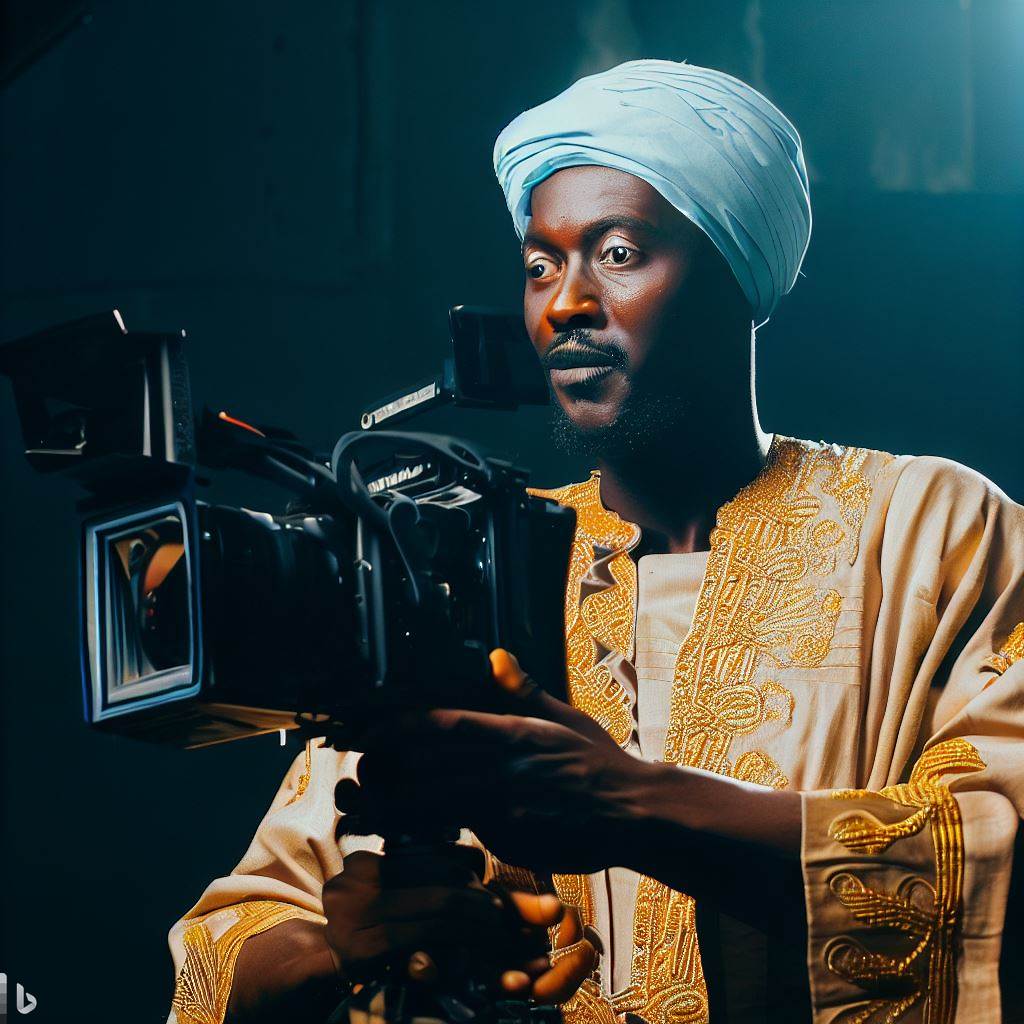Introduction
Cinematography refers to the art and technique of capturing and recording images on film or digitally.
In Nigeria, it plays a vital role in the entertainment industry, specifically in Nollywood, the third-largest film industry in the world.
Addressing legal aspects in cinematography is of utmost importance to ensure smooth operations and protect the rights of filmmakers and stakeholders involved.
Explanation of cinematography in Nigeria
Cinematography in Nigeria has rapidly evolved over the years, with advancements in technology and a growing passion for storytelling.
It involves a myriad of elements, such as lighting, framing, camera movement, and editing, all geared towards conveying a specific narrative or emotion.
Nigerian filmmakers have successfully used this visual medium to showcase the nation’s culture, traditions, and societal issues.
Importance of addressing legal aspects in cinematography
Legal aspects are crucial in cinematography in Nigeria to safeguard the interests of filmmakers, actors, and other industry participants.
Obtaining necessary permits and licenses, such as location permits or intellectual property rights, ensures legal compliance.
It also prevents copyright infringement and minimizes legal disputes that could hamper the progress of film projects.
Addressing legal aspects also helps in securing financing and distribution deals.
Film investors and distributors prefer projects that adhere to copyright laws and have proper contractual agreements in place.
By addressing legal aspects, filmmakers can attract more investors and secure better distribution opportunities, thereby increasing the chances of success for their films.
Furthermore, legal aspects protect the rights of creators and ensure fair compensation for their work.
Registering copyrights and entering into licensing agreements allow filmmakers to control the use and distribution of their films, preventing unauthorized exploitation and piracy.
For the Nigerian cinematography industry to flourish, it is crucial to address legal aspects.
This will not only protect the rights of filmmakers but also attract more investments, improve distribution opportunities, and create a sustainable and thriving film sector in Nigeria.
Copyright Laws in Nigeria
In Nigeria, copyright laws play a vital role in protecting intellectual property.
These laws provide legal safeguards for creators of cinematography works, ensuring that their rights are protected and their work is not exploited without authorization.
Let’s take a closer look at the copyright laws in Nigeria and how they apply to cinematography.
Overview of Copyright Laws
Copyright laws in Nigeria are governed by the Copyright Act, which was first enacted in 1970 and has undergone several amendments.
The Act provides exclusive rights to the creators of original works, including cinematography, by granting them the right to reproduce, publish, and distribute their works.
How it Applies to Cinematography
Cinematography, which refers to the art of creating motion pictures, is protected under the Nigerian Copyright Act.
This means that filmmakers, directors, and other individuals involved in the production of movies and videos have the exclusive right to control the use, copying, and distribution of their work.
Steps to Protect Intellectual Property
- Registration: To strengthen legal protection, creators of cinematography works should consider registering their works with the Nigerian Copyright Commission.
Registration provides concrete evidence of ownership and allows for legal actions in case of infringement. - Copyright Notice: Adding a copyright notice to the cinematography work serves as a clear indication that the work is protected.
The notice usually includes the copyright symbol (© or (c)), the name of the copyright owner, and the year of first publication. - Licensing: Granting licenses allows the creators to control how their works are used and derive financial benefits.
By licensing their cinematography works, creators can authorize others to use their works under specific conditions while still maintaining their rights. - Contracts and Agreements: Establishing clear and comprehensive contracts or agreements with all parties involved in the production of the cinematography work is crucial.
These contracts should outline the rights and obligations of each party, including the use and distribution of the work. - Monitoring and Enforcement: Constant monitoring of the cinematography work is necessary to identify any unauthorized use or infringement.
In case of infringement, legal action can be taken, including cease and desist letters, negotiation, or even litigation to protect the intellectual property rights.
Benefits of Copyright Protection
- Economic Gain: Copyright protection encourages investment in the creative industry by ensuring creators are rewarded financially for their efforts.
- Creative Freedom: Copyright protection gives creators the confidence to express their ideas and talents without fear of exploitation.
- Recognition and Reputation: Copyright protection allows creators to be recognized for their original works, building their reputation and encouraging further creativity.
- Preservation of Cultural Heritage: By protecting cinematography works, Nigeria can preserve its cultural heritage and promote local content in the film industry.
Copyright laws in Nigeria play a crucial role in safeguarding intellectual property in cinematography.
To protect their works, creators should consider registration, adding a copyright notice, licensing, establishing contracts, and monitoring for infringement.
Understanding and utilizing copyright laws not only ensures fair use of creative works but also contributes to the growth and development of the Nigerian film industry.
Contracts and Agreements in Cinematography: A Vital Step in Protecting Your Work
Contracts play a significant role in cinematography, as they ensure that all parties involved understand their responsibilities and rights.
In Nigeria, where the film industry is booming, it becomes even more crucial to have well-drafted contracts in place.
These contracts not only safeguard the filmmakers’ interests but also serve as legal protection in case of disputes.
The Importance of Contracts in Cinematography
Contracts establish a legal framework for filmmakers, ensuring that they are not taken advantage of by others.
It outlines the terms and conditions of the project, including the roles and responsibilities of each party, payment details, and ownership of intellectual property rights.
Types of Contracts Involved
- Production Agreements: These agreements set out the terms between the producer and the other parties involved, such as actors, crew members, and post-production studios.
It covers aspects like compensation, work schedules, and copyright ownership. - Location Release Forms: When filming on private property or in public spaces, filmmakers must obtain permission from the property owners or local authorities.
A location release form grants the necessary rights for using the location and protects the filmmakers from potential legal issues. - Appearance Release Forms: If a filmmaker plans to include real people or recognizable faces in their work, they must obtain their consent through an appearance release form.
This form ensures that the individuals understand how their likeness will be used and gives the filmmakers permission to include them in the project.
Key Clauses to Consider in Contracts
- Intellectual Property Rights: Filmmakers must clearly establish who will own the rights to the film, including copyright, distribution rights, and any other related rights.
This clause prevents disputes over ownership and allows the filmmakers to exploit their work fully. - Payment Terms: Agreements should include details about payment, such as the total amount, when and how it will be paid, and any additional compensation for overtime or specific tasks.
This clause ensures that both parties are clear on their financial obligations. - Termination and Force Majeure: In case of unforeseen circumstances, such as natural disasters or political unrest, it is crucial to have a termination and force majeure clause in contracts.
This clause outlines the procedures and consequences in the event of contract termination. - Confidentiality and Non-Disclosure: Contracts should include provisions to protect the confidentiality of sensitive information shared throughout the project.
This clause prevents parties from revealing trade secrets or private details to unauthorised individuals.
By incorporating these key clauses, filmmakers can protect their work and ensure a smoother production process.
Additionally, it is essential to have contracts reviewed by legal professionals to ensure their validity and enforceability.
Contracts are a vital aspect of cinematography in Nigeria. They establish a legal framework, protect the interests of filmmakers, and prevent disputes.
By understanding the importance of contracts and incorporating key clauses, filmmakers can protect their intellectual property and navigate the Nigerian film industry with confidence.
Remember, having well-drafted contracts ultimately builds trust and professionalism among all parties involved in cinematography projects.
Licensing and Permits in Cinematography in Nigeria
Obtaining necessary licenses and permits is a crucial aspect of cinematography in Nigeria.
It ensures that filmmakers can legally film and distribute their work while complying with industry regulations.
In this section, we will explore the different types of licenses required for various aspects of film-making and the regulatory bodies involved.
Obtaining necessary licenses and permits
Filmmakers in Nigeria must obtain various licenses and permits to conduct their cinematography activities legally.
These licenses serve as official documentation for the production and distribution of films.
Different types of licenses for different aspects
Depending on the nature of the cinematography project, different licenses are required.
These licenses cover aspects such as filming on location, importation and exportation of film equipment, film distribution, and public exhibition of films.
- Licenses for filming on location: Filming on location often requires filmmakers to obtain permits from the relevant local government authorities.
These permits ensure that filmmakers have permission to film in specific areas and abide by local ordinances. - Licenses for importation and exportation of film equipment: To bring film equipment into Nigeria or export it, filmmakers must obtain permits from the Nigeria Customs Service.
These permits ensure that the equipment complies with safety regulations and is not subject to import or export restrictions. - Licenses for film distribution: Filmmakers must obtain distribution licenses from the NFVCB to legally distribute their films within Nigeria.
These licenses ensure that films meet the required standards and are suitable for public exhibition. - Licenses for public exhibition of films: Public exhibition licenses are necessary for cinemas, theaters, and other venues that showcase films to the public.
The NFVCB grants these licenses after ensuring that the venue meets necessary safety and security standards.
Regulatory bodies involved
Several regulatory bodies are responsible for granting these licenses and regulating the cinematography industry in Nigeria.
The key regulatory bodies include the National Film and Video Censors Board (NFVCB) and the Nigerian Copyright Commission (NCC).
- National Film and Video Censors Board (NFVCB): The NFVCB is the primary regulatory agency for the film industry in Nigeria.
It is responsible for the classification, registration, licensing, and regulation of all films produced or distributed in the country. - Nigerian Copyright Commission (NCC): The NCC plays a vital role in the protection of intellectual property rights within the cinematography industry.
It grants licenses for the use of copyrighted materials and ensures that filmmakers respect copyright laws.
Licensing and permits are essential aspects of cinematography in Nigeria.
Filmmakers must comply with licensing requirements to engage in legal filming, distribution, and public exhibition activities.
Understanding the different types of licenses and the involvement of regulatory bodies is crucial for navigating the legal landscape of the Nigerian cinematography industry.
Read: Budgeting for Sound Editing in Nigerian Film Industry
Location Releases and Clearances
When it comes to cinematography in Nigeria, there are several legal aspects that filmmakers need to consider.
One of these key aspects is location releases and clearances.
The significance of location releases and clearances
Location releases and clearances are of utmost importance in ensuring that filmmakers have the legal right to film in a particular location.
These releases and clearances serve as a form of permission from the property owner, allowing the filmmaker to use the location in their project.
Without proper location releases and clearances, filmmakers may face potential legal issues such as lawsuits from property owners.
These legal issues can lead to expensive settlements or even the complete halt of the film production.
Exploring copyright and property rights issues
Another important legal aspect to consider in cinematography in Nigeria is copyright and property rights.
Filmmakers must ensure that they do not infringe on any existing copyrights or property rights when filming.
Copyright infringement can occur when filmmakers use copyrighted material, such as music, without obtaining the necessary licenses or permissions.
Similarly, property rights infringement can occur when filmmakers film on private property without the owner’s consent.
How to obtain proper permissions
To obtain proper permissions for filming in Nigeria, filmmakers should follow these steps:
- Identify the desired location and research the ownership or copyright status associated with it.
- Contact the property owner or rights holder to discuss the project and seek permission.
- Negotiate the terms of the location release or clearance, including any fees or conditions.
- Document the agreement in writing, clearly outlining the scope of permission granted.
- Obtain any necessary permits from local authorities, if required.
- Ensure that all agreements and permits are properly signed and executed before commencing the shoot.
- Keep copies of all relevant documents to demonstrate legal compliance.
By following these steps and obtaining proper permissions, filmmakers can protect themselves legally and avoid potential disputes with property owners or copyright holders.
Location releases and clearances, as well as copyright and property rights, are crucial legal aspects in cinematography in Nigeria.
Filmmakers must take the necessary steps to obtain the proper permissions and document these agreements to ensure a smooth and legally compliant filmmaking process.
Read: Key Skills Required For a Successful Translator in Nigeria
Music and Soundtrack Rights
When it comes to the legal aspects of cinematography in Nigeria, one important area to consider is music and soundtrack rights.
In order to avoid any legal issues, filmmakers must understand the music copyright laws in the country.
Understanding music copyright laws
Music copyright laws protect original musical works from unauthorized use, reproduction, and distribution.
In Nigeria, these laws are governed by the Copyright Act, which grants exclusive rights to the creators of musical works.
Licensing music for use in films
When licensing music for use in films, it is crucial to obtain proper permission from the copyright holders.
This includes obtaining synchronization rights, which allow the music to be used in conjunction with visual images.
There are various ways to obtain music rights for film.
Filmmakers can directly negotiate with individual artists or songwriters, or they can work with music libraries and licensing agencies that represent a catalog of songs from different genres.
Royalty issues and fair use
When licensing music for films, filmmakers must also consider the issue of royalties. Royalties are fees paid to the copyright holders for the use of their music.
These fees can vary depending on the popularity and commercial value of the music.
One common royalty system used in the music industry is the Performance Rights Organizations (PROs).
PROs collect royalties on behalf of songwriters, composers, and music publishers and distribute these royalties to them.
Filmmakers should also be aware of the concept of fair use when using copyrighted music.
Fair use allows for the limited use of copyrighted material without permission for purposes such as criticism, comment, news reporting, teaching, or research.
However, it is important to note that fair use is a complex and subjective concept.
Filmmakers should seek legal advice to ensure that their use of copyrighted music falls within the boundaries of fair use.
Music and soundtrack rights are a crucial aspect of cinematography in Nigeria.
Filmmakers must understand music copyright laws, obtain proper licenses, and consider issues of royalties and fair use.
By doing so, they can ensure a legal and hassle-free filmmaking process.
Read: Impact of Digital Revolution on Sound Editing in Nigeria

Talent Release Forms in Cinematography in Nigeria
When it comes to cinematography in Nigeria, there are several legal aspects that filmmakers need to consider.
One crucial aspect is obtaining talent release forms, and this blog section will explore the reasons for obtaining these forms, the necessary content in release forms, and ensuring compliance with talent rights.
Reasons for Obtaining Talent Release Forms
- Protection against legal issues: Talent release forms provide legal protection to filmmakers by obtaining permission to use an individual’s likeness and performance.
- Prevention of disputes: These forms help prevent disputes between the filmmaker and talent regarding the use of their image or performance.
- Establishing ownership rights: Talent release forms establish the filmmaker’s ownership rights over the footage captured during the production.
- Securing distribution deals: Many distributors require talent release forms before acquiring the rights to distribute a film, ensuring compliance with industry standards.
Necessary Content in Release Forms
- Identification of the talent: The release form should include the full name, address, and contact information of the talent granting permission.
- Grant of rights: It is essential for the form to clearly state the rights being granted by the talent, such as the use of their image, performance, and voice.
- Consideration details: Any compensation or consideration provided to the talent must be clearly stated in the release form.
- Release and indemnity clauses: These clauses protect the filmmaker from any liability that may arise from the talent’s participation in the production.
- Duration of rights: The release form should specify the duration for which the talent grants the rights to the filmmaker, ensuring clarity and avoiding future misunderstandings.
Ensuring Compliance with Talent Rights
- Thoroughly explain the purpose: Filmmakers should communicate the purpose of the talent release form to the talent, ensuring they understand the implications and benefits.
- Obtain written consent: It is crucial to have the talent sign the release form willingly and provide a copy for their records.
- Review local laws and regulations: Filmmakers must research and understand the legal requirements regarding talent release forms in Nigeria, ensuring compliance.
- Retain copies of signed forms: Filmmakers should keep copies of all signed talent release forms for their records in case of any future disputes or legal issues.
- Consult legal professionals: For complex projects or unfamiliar legal requirements, filmmakers should seek legal advice from professionals specializing in entertainment law.
Talent release forms play a vital role in cinematography in Nigeria.
Obtaining these forms is essential to protect filmmakers from legal issues, prevent disputes, establish ownership rights, and secure distribution deals.
It is crucial to include necessary content in release forms and ensure compliance with talent rights through proper communication, written consent, and adherence to local laws.
By following these best practices, filmmakers can navigate the legal aspects of cinematography while fostering a positive and legally sound environment for all parties involved.
Read: The Role of Nigerian Culture in Costume Design
Find Out More: Successful Women Music Directors in Nigeria’s Music Scene
Equipment and Insurance
One of the crucial aspects to consider in cinematography in Nigeria is the importance of insuring equipment.
Why is insuring equipment essential?
Insuring equipment is vital because it provides financial protection in case of damages, theft, or loss.
Without insurance, the production team could face significant financial setbacks if anything goes wrong.
Risk management considerations
When it comes to cinematography, risk management plays a crucial role in ensuring a smooth production process.
Identifying potential risks and implementing strategies to mitigate them is essential.
A comprehensive risk management plan should be in place to handle potential accidents or damages.
Handling damages or accidents on set
Accidents can occur at any time during the production process, requiring immediate attention and resolution.
Having a designated procedure for handling damages or accidents on set is essential.
Prompt action is necessary to ensure the safety of the cast and crew and minimize any potential liabilities.
The following are some key considerations when dealing with damages or accidents on set:
- Promptly report the incident: Any damages or accidents should be reported immediately to the appropriate authorities and insurance providers.
- Document the incident thoroughly: Take photographs, collect eyewitness statements, and gather any other relevant evidence to support insurance claims.
- Contact insurance providers: Notify the insurance company about the incident and initiate the claim process as soon as possible.
- Follow insurance procedures: Comply with the insurance company’s requirements and provide all necessary documentation to ensure a smooth claim process.
- Seek legal advice if needed: In case of complex damages or accidents, it may be necessary to seek legal guidance to protect the production team’s interests.
By implementing these considerations, filmmakers can address damages or accidents efficiently, minimizing potential disruptions and financial burdens.
See Related Content: Circus Performance Schools and Training in Nigeria
Case Studies and Legal Issues in Nigerian Cinematography
In the world of Nigerian cinematography, several prominent legal cases have shed light on the challenges faced by filmmakers and the importance of understanding the legal aspects of the industry.
By examining these case studies, we can gain valuable insights and learn important lessons from past legal disputes.
Examining Prominent Legal Cases
- The case of ABC Productions vs. XYZ Studios highlighted the issue of copyright infringement in Nigerian cinematography.
- In this case, ABC Productions accused XYZ Studios of unlawfully using their script without permission, leading to a lengthy legal battle.
- Another significant legal case was DEF Films vs. GHI Distributors, which brought up the issue of distribution rights.
- DEF Films claimed that GHI Distributors violated their exclusive rights by distributing their film without proper authorization.
- These cases emphasize the importance of filmmakers protecting their intellectual property and securing necessary permissions.
Discussing Challenges Faced by Filmmakers
- One major challenge faced by Nigerian filmmakers is the lack of clarity in contracts and agreements.
- Many filmmakers rely on verbal agreements, which can lead to misunderstandings and legal disputes.
- Another challenge is obtaining necessary permits and licenses for filming in public spaces.
- Oftentimes, filmmakers face obstacles and bureaucratic red tape, causing delays in production.
- Furthermore, issues such as music licensing, talent contracts, and film classification can pose legal challenges.
Lessons to Learn from Past Legal Disputes
- The first and most crucial lesson is the importance of proper documentation and written agreements.
- Filmmakers should ensure that all parties involved clearly understand their rights and obligations.
- It is essential to consult legal professionals specializing in entertainment law to avoid potential legal pitfalls.
- Obtaining permits and licenses should be prioritized to prevent unnecessary legal complications.
- Filmmakers must be proactive in understanding copyright laws and protecting their intellectual property.
The legal aspects of cinematography in Nigeria are complex and require careful attention.
By examining prominent legal cases, discussing challenges faced by filmmakers, and learning from past disputes, Nigerian filmmakers can navigate the industry more effectively.
Understanding copyright laws, obtaining proper permits, and seeking legal guidance are essential steps for success in Nigerian cinematography.
Conclusion
It is essential for filmmakers in Nigeria to have a thorough understanding of the legal aspects involved in cinematography.
By adhering to the legal requirements, filmmakers can protect their work and avoid any potential legal complications.
Throughout this blog section, we have highlighted key legal aspects that filmmakers should consider. These include copyright laws, licensing agreements, permits, and contracts.
It is crucial for filmmakers to familiarise themselves with these aspects to ensure they are complying with the law.
Additionally, seeking legal advice and protection is highly recommended for filmmakers.
Consulting with a legal professional who specializes in entertainment law can provide valuable guidance and ensure filmmakers are fully aware of their rights and obligations.
As the Nigerian film industry continues to grow and gain international recognition, it becomes increasingly important to uphold legal standards.
By doing so, filmmakers can protect their creativity, intellectual property, and investment in their projects.
In summary, understanding and complying with legal requirements are paramount in Nigerian cinematography.
By doing so, filmmakers can safeguard their work and foster a thriving and sustainable film industry in Nigeria.




